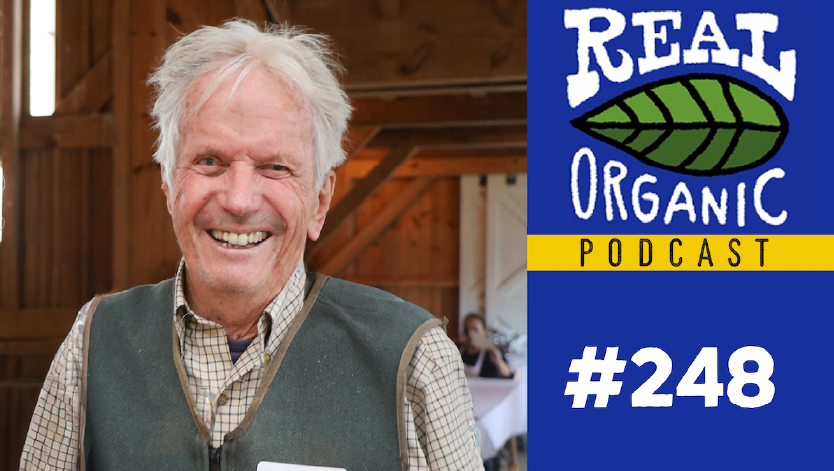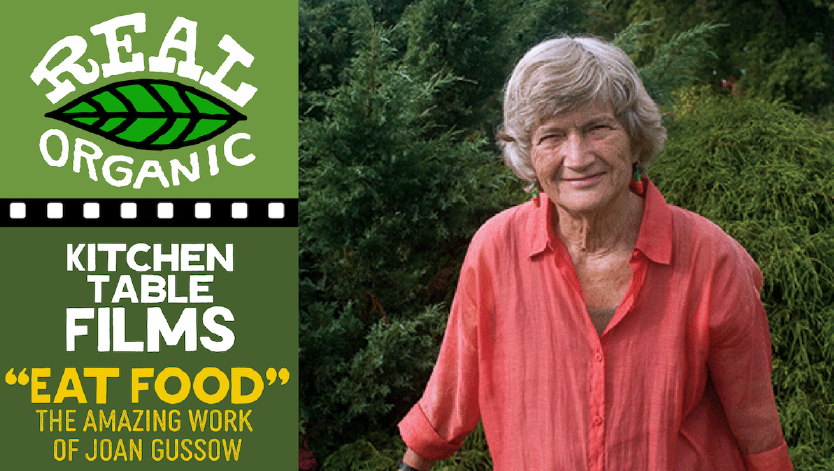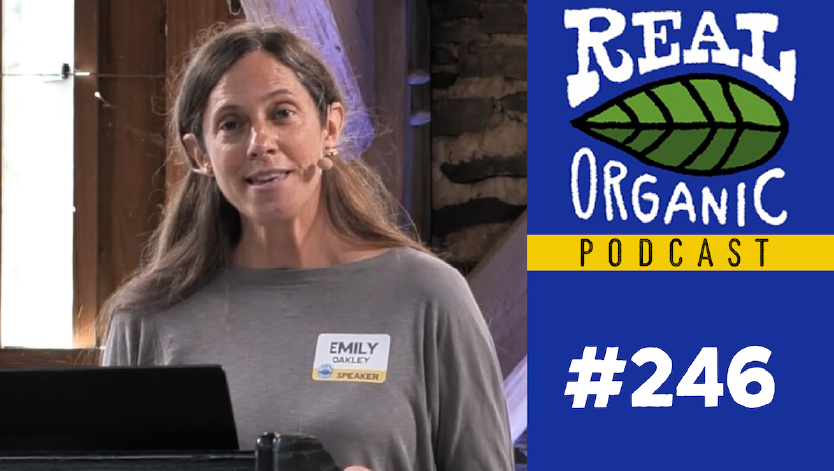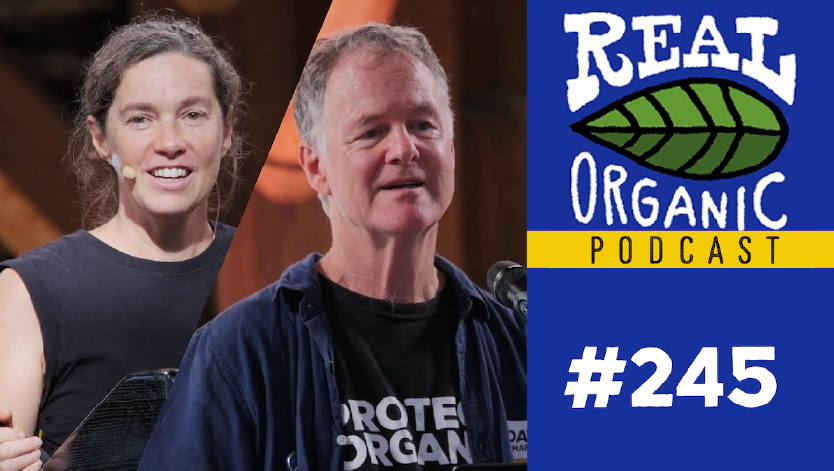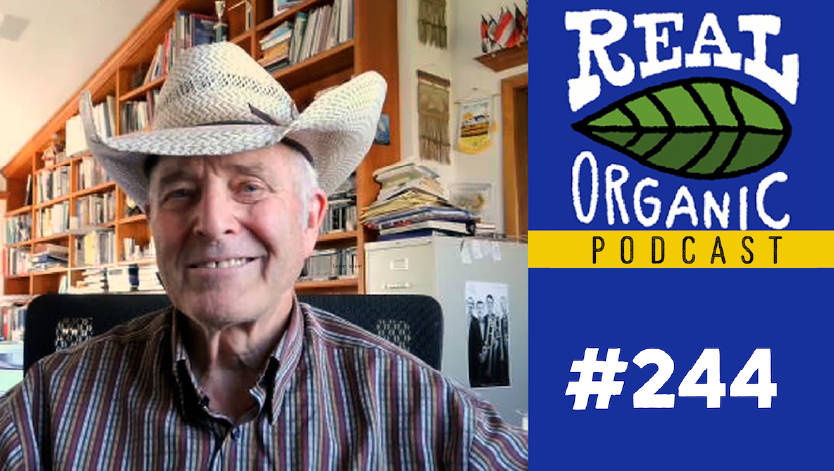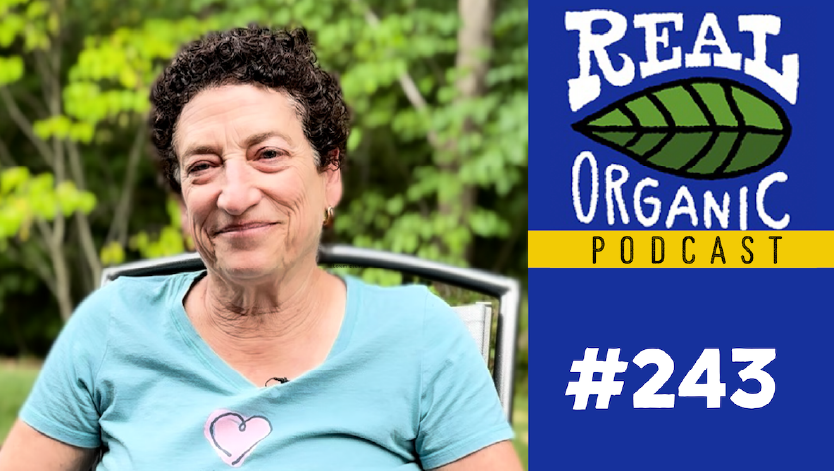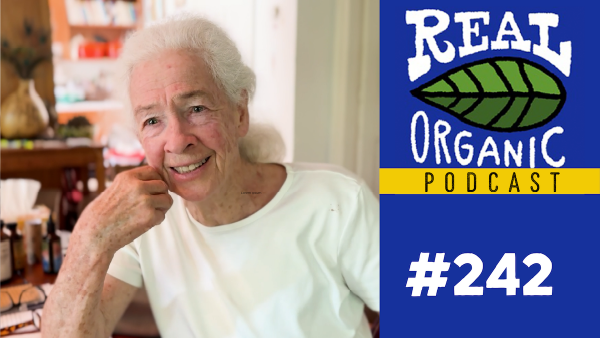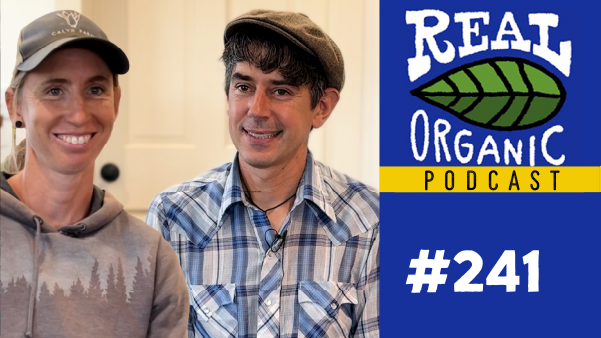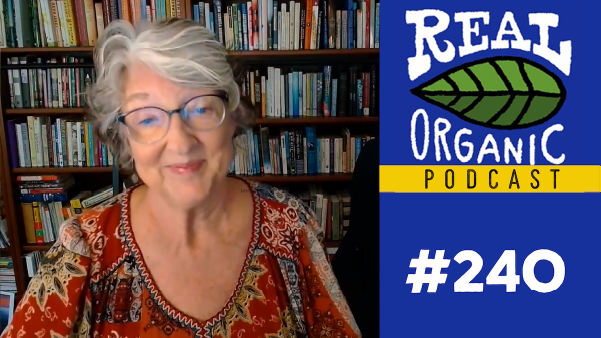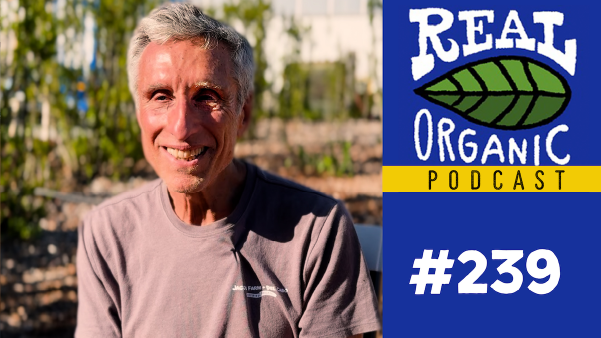Episode #222
Ladd Harris: Feeding NFL Athletes Real Organic Food
In this episode, Houston Texans wellness coach Ladd Harris shares why organic food for athletes is about much more than clean eating — it’s about performance, trust, and connection to the farm. As he built a nutrition program for professional football players, Ladd discovered the power of soil-grown food and now sources directly from Real Organic Project-certified farms. He explains how knowing your farmer means knowing your food, and how nutrient-dense, soil-grown crops give athletes the edge they need on and off the field. Whether you’re feeding elite athletes or your own family, Ladd makes the case for real food grown in real soil.
Our Ladd Harris interview has been edited and condensed for clarity:
You can subscribe and download episodes of our show through your favorite podcast app, our YouTube channel, or stream the audio-only version here:
Dave Chapman interviews Ladd Harris at King Grove Farm in Eustis, FL, April 2025
Dave Chapman 0:00
I’ve wanted to interview you for a long time, so I’m glad that we got together here at King Grove Organic Farm. We’ve been talking for the last day. For people who don’t know Ladd, Ladd is a wellness coach at the Houston Texans, an NFL team. I heard about you because I heard from Hugh and Lisa Kent that you were buying blueberries from King Grove Organic Farm for the Houston Texans and because you have a lot of thoughts and opinions about how athletes should be fed in order to get to optimal performance.
Ladd Harris 0:48
Yeah, without a doubt. Off the top, thank you for the opportunity to come here and talk today. That whole idea, for me, Dave, was born out of – when you think about high performance for an athlete and what that means – you’re trying to give the athlete the best opportunity to give their body what it needs to perform at a high level. Fundamentally, to me, that always comes back to food, and specifically the quality of food that’s going into their bodies.
Ladd Harris 1:30
In my position – I’m a dietitian by trade – that pursuit of finding the highest quality food is a big part of what I do, because as a dietitian and a nutritionist, I know that the higher quality food that I can find, the better chance I have of getting the athletes what they need to perform, stay healthy, and do what they do out on the field. What has driven me to that is an understanding of how important where food comes from is for the nutrient quality and what it offers the body for performance.
Dave Chapman 2:15
This is interesting to me. This is a pretty big shift from a generation ago, maybe even two generations. I’m thinking of Frederick Stare, who was the head of nutrition at Harvard for a long time. I think he had a 40-year career there. He used to debate Paul Hawken. When Paul was a young guy, he ran Erewhon, health food stores, and they also were distributors of organic grains to all kinds of health food stores or co-ops around America. Fred Stare was absolutely convinced that the standard American diet was the best that there could be and that a calorie was a calorie. You had to watch your calories, but otherwise you didn’t need to worry about it too much because it was fortified. That food was fortified by the labs.
Dave Chapman 3:14
I think he was wrong. Paul said, “Every time that we would have one of these public debates, he would win, and I was right.” But at that time, he had this wall of nutritional science behind him that he could quote. He was not a stupid man; he was a smart man. His beliefs were different. He worked for the Sugar Institute. He was on their board of advisors. You have a very different idea of food, health, and what the impact of food is. What are some of your ideas, and how did you get them?
Ladd Harris 3:59
That’s a big question. I think for me, playing off of what you said, what we’re really keying in on is some of the challenges of nutrition science and how the science and nutrition are done. When you zoom out far enough, you start to realize that nutrition as we know it today, from a scientific method, is a relatively young science when you compare it to other classical sciences of physics and mathematics. We’re talking about most of our vitamins and minerals and the way that we know them today being kind of discovered in the early 1900s. We’re talking just over a hundred years ago that we’ve really started to key in on some of these key nutrients and chemicals that make our bodies work.
Ladd Harris 4:55
When you look at it from that perspective and think about that journey of how you start to understand something – and especially a complex system like the human body – that’s one of the big challenges of nutrition science. In my opinion, to understand the complex system, you have to reduce it to its parts to understand that system. You learn a lot through that process. You learn what vitamin B6 does; you learn what all of these nutrients do and how key these nutrients are to basic function and keeping the body alive. But what you lose in that process is the concept of the whole and the whole organism. You start to miss, “Okay, we break the system down into its tiniest pieces to understand what it’s doing, but we lose the context of everything else around it that’s happening in the body and how they interrelate and the synergy between it.”
Ladd Harris 6:00
I think, over the last hundred-plus years, nutrition science has done a great job of identifying those key nutrients that are essential to life. That’s a key part. But where we’re at now is, “Okay, well, we understand those things – what it takes to keep somebody alive – but that’s not the same as thriving and optimal health.” I don’t think they look very far to understand what the American diet has done to the health of America. That’s pretty obvious from that standpoint with the state of American health.
Ladd Harris 6:43
Right now in time, from my standpoint, we’re at that point of, “Okay, well, what is that next level of understanding and bringing back the whole into the picture, and understanding the synergy between everything, and learning more about all of these other compounds and nutrients outside of vitamins, minerals, and macros that do impact the body in ways that we don’t even begin to understand?”
Dave Chapman 7:10
This is interesting. People talk a lot about secondary metabolites and biochemicals. My understanding is they’ve identified vaguely a couple of hundred thousand secondary metabolites at this point, which are compounds that the plant scientists used to consider secondary because they didn’t think they served any function for the plant. It was like, “Well, if we take this away, the plant doesn’t die. We don’t really know what it does.” I heard somebody describe it as nutritional dark matter. But as we go along, we seem to be learning that, in fact, these compounds are doing a great deal, but it’s not always obvious. We don’t know about the combinations of how they influence each other. Am I getting that right?
Ladd Harris 8:06
Yeah. It’s a complex system. I think that’s part of what I love about nutrition science and what food can do for the body – there is that little bit of mystery right now of understanding what all of those chemicals do. But I think you keyed in on something very important there. We’ve identified those key parts of, “Okay, I take away this nutrient, and the plant dies. I take away this nutrient, and some type of symptom develops in the human body.” But again, that’s not the same as thriving. I think that’s the next level of where science is going: how do we identify those other things in food, in life, and in the environment that allow somebody to thrive – not just survive – not die? There’s a difference there in the nuance of what you’re saying.
Dave Chapman 9:09
Now, as a wellness coach for a professional football team, I’m assuming that at least your bosses would like you to be focused on performance as opposed to health. Aren’t necessarily the same, are they?
Ladd Harris 9:27
Yes and no, I would argue. When you’re talking about performance nutrition, it’s built on a foundation of health. You have to check certain boxes if you’re really trying to fine-tune a system. A lot of what makes an impact from a sports nutrition standpoint is the fine-tuning of things that you’ve already got in place – the basics. When you’re looking at trying to create a system where an athlete has a little bit more endurance, or has the ability to produce a little bit more power, or repeat the ability to produce that power, all of that stuff is based off of a foundation of health. You’re just trying to fine-tune it at the sports nutrition end of it.
Dave Chapman 10:28
It’s interesting. Of course, there’s also the rate of healing from injuries, which would be a high level of health of the system that is resilient.
Ladd Harris 10:40
There’s no doubt. Nobody wants to see an athlete get injured. That’s never something that’s a fun thing to go through, just knowing what that’s going to potentially cost the athlete long term. But that is a place where nutrition can make a big impact – in those acute periods of injury. If you think about what’s going on in the body from a physiological standpoint, there’s a huge disruption in the homeostasis of the body. The body’s trying to repair itself. There’s a ton of different systems that go in and are activated when an injury occurs. If the body doesn’t have the correct nutrients or the right environment around that, that process is going to be slowed down.
Ladd Harris 11:38
I always give the example of it’s like you’re trying to rebuild a house. If you are building a house and you’re short on nails, and those just aren’t available, what are you going to do? You’ve either got to go find the nails to make the house strong, or you’ve got to build the house without the nails. What’s the quality of that construction going to be? It’s very much the same way in the human body: as the body’s repairing itself, if it doesn’t have the essential things that it needs to repair itself, the quality of that repair is probably going to be compromised, and how long it takes to complete the job is probably going to be longer. The key part being, probably, we don’t necessarily know that objectively in science, but intuitively it makes sense from that standpoint.
Dave Chapman 12:37
One of the things I see is a lot of your work is based on your best understanding, rather than this test proved it. This confirmed it. You’re talking about a system that is so complex and subtle that it’s very hard to prove anything. You can prove that some things are very bad, but mostly even that’s like looking at the human population over time and looking at outcomes and going, “The people who ate Twinkies did not do as well as the people who ate carrots.” Overall, one person might just thrive on Twinkies.
Ladd Harris 13:15
Going back to the challenges of nutrition science and that whole world, I think that this is a challenge across the nutrition field. In terms of what it would take to design a study that was able to control for so many different factors that go into what creates optimal performance because it’s not just food. It’s not just how strong the guy is. There’s so many multiple factors that go into that and uncontrollables that to design a study of that scale and do it in a way that you could objectively say, yes or no, that would be a huge endeavor and likely a huge cost. That’s one of the things that slows nutrition science down: that type of science just is so difficult to do that we never get to those answers of conclusivity. But what i, as a professional, am able to rely on is the person in front of me, and their subjective feedback and their subjective progress of how they respond to some of the interventions that we do.
Dave Chapman 14:47
If they’re feeling better, perhaps they’re noting that they’re clearer; perhaps they’re noting that they…I think it’s probably measurable if they’re faster, but a lot of the things that happen out there on the field are not measurable in that sense. It’s not just how fast you can run; it’s a lot of things – explosive, mental things, and all these other things. Before I go into the real world with you, I want to go to one more thing. What you’ve talked about is, I would say, the foundational beliefs of the organic movement, although it’s funny because there are people who would say that they’re in an organic movement these days who don’t share these beliefs and have never thought about them.
Dave Chapman 15:39
They don’t think about the quality of food and health. What industrial organic has come about is the absence of pesticides, which is also very important. But as Eliot has said, it’s not if you stop using pesticides that it makes it organic; it’s that if it’s really organic, you don’t need pesticides because the whole system starts to become imbalanced, as you and Lisa have been talking about. That they don’t need them because there’s balance in the system – it’s a healthy system. But surely the presence of pesticide residues – which most American food has, and if it’s not organic, it almost certainly does – must also be a factor, although one that’s hard to measure for the athletes for whom you are trying to design the food system, which will make them the healthiest they can be.
Dave Chapman 16:43
Do you think of that? Do you agree with that? You and I both have PFAS in our bodies, which is a huge class of chemicals – 2000 chemicals are PFAS chemicals. They were invented by our friends at 3M, and they’re manufactured by Dow and many other people. They’re on Teflon, but they’re on a lot of things. They’re probably on the cardboard that your French fries from McDonald’s come in. They’re all over the place, in our water, and in us. Somebody else said, “We all pee glyphosate.” They’ve tested that, and it’s true for 80% of people.
Dave Chapman 17:32
Regardless of whether you’re eating a chemical or an organic diet, I have it too, and it’s just part of our world that we’ve created. Do you think about this? Because certainly, there’s still a big difference in intensity between somebody who is, say, choosing to eat an organic diet and somebody who’s not eating an organic diet. Do you think about this for the athletes?
Ladd Harris 17:58
From my perspective, I’m always looking at ways that we can give their bodies what they need and keep out of their bodies what potentially might be harmful or impeding to their performance. I think what you ask is a very poignant question. To be fair, just like the challenges that nutrition science has in proving what is effective, there can be some challenges in proving exactly what these chemicals are doing in our bodies. But I do think we’re at a point where we have enough observational data to know that it’s probably not good. It’s probably detrimental, especially when you spread it out over a longer time horizon. What’s the most logical thing to do? Am I going to just say, “Yeah, it’s not a problem,” and expose myself to it? Or am I going to try and minimize exposure to it? I would say the logical thing is to minimize exposure because there’s a lot of unknowns in that space.
Ladd Harris 19:21
From a performance standpoint, with the athletes, again, you mentioned the term system. That’s what it comes down to for me – when you think about how a plant thrives or a human thrives. It does come down to a very specific type of system that they’re able to thrive in. Absolutely, I think that those additional chemicals that can be found in non-organic food are specifically things that I try to avoid, not only because of what they might be doing in the body, but also because of the effect that they have on the overall system.
Ladd Harris 20:16
Some of the problems that you start to see with resistance, what it does to the soil, and the whole system of how food is grown. I think that there’s a lot of moving parts there that go back to not just what that chemical is doing in a body, but also what it is doing to the environment that we live in and our ability to produce high-quality food long-term.
Dave Chapman 20:40
Great. You’re expanding your responsibility to be some responsibility for the world, for how the food is produced, and what’s the impact on all of us. It’s a bigger viewpoint. Let me ask you; you came to Houston, and you got hired. I know you were…let’s just talk for a minute about the project you did for the Army before that. It’s not so different. You were working with elite soldiers who were the people – like SEALs and Green Berets – who were sent in to do very difficult and dangerous things. What was your task as part of this team?
Ladd Harris 21:38
My task was to work as part of the sports performance group. Thinking about strength and conditioning, how the soldiers train and prepare themselves from a physical standpoint, and how they take care of their bodies from a sports medicine standpoint. Working side by side with physical therapists. Then my role specifically was more from the food side of how do we support not only their performance, but also the overall longevity of their career with what they’re eating and access to that.
Ladd Harris 22:20
It’s the same in a lot of ways, but also a very different challenge because in sports, specifically, if you’re working in a team sport like football, there are a lot of unknowns, but you basically know what you’re dealing with. You know the game and what you’re up against. Working with the Army, there’s a ton of unknowns where they might be required to be on very short, targeted, specific missions that last a few minutes, or they might be traversing terrains for miles, hours, or days. Those, from a performance standpoint, require very different kinds of nutritional requirements.
Ladd Harris 23:09
Preparing the guys for that was a lot different from a performance standpoint. Then specifically, like just from a food standpoint, there are a lot of challenges in the military food system that made it difficult to get the quality of food that I would have thought was appropriate for the guys who were out there defending our country. That was hard because you see what they do, what they sacrifice, and what is made available through the different government systems. It was hard because it’s not very good quality.
Dave Chapman 24:02
Earlier you talked about buckets of money with me and the way that the allocations go in the military. Like, “This money is for weaponry, and this money is for bullets, and this money is for food.” The food bucket would be very small, and the bullet bucket would be very large, but you couldn’t take a little extra from the bullet bucket, so you had to live within the budget constraints that have been offered. You felt there wasn’t much institutional respect for what you were trying to do – creating not only food that is better for people but also that is a pleasure to eat.
Ladd Harris 24:51
I don’t know if I’d go as far as to say there wasn’t institutional respect. I would probably term it more in terms of people doing the best job they could with the resources that they were given, and to no fault of their own. People are put in these positions where they don’t necessarily have the expertise in food to know the nuances of what a soldier actually needs to thrive. Again, we’re talking about thriving, not just essentially surviving, although in certain cases in the military, it is just about surviving and getting the systems sustenance that you need. But on the other side of that, I think most people there were well-intentioned; just they don’t know what they don’t know. They’re given a budget, and they do what they need to do to make that budget and get the food out there. They’re very good at that, but good isn’t great. Good isn’t optimal. Good isn’t ideal.
Dave Chapman 26:18
To some degree, you had a very similar mission when you moved from the Army to the Houston Texans. Your mission was to help these athletes be all they could be, to have a long career and a healthy one. I assume, to launch them on health after that, what was it like when you got there? What was the food culture when you got there?
Ladd Harris 26:53
It was interesting. We operated out of our stadium. There’s a food service group that manages the stadium. So think about the food that you would see if you went to an NFL game. The people who make all of the sweet food, the concession food, and whatnot. That culinary group is the group that was also cooking for the team. When I got there, there wasn’t a lot of guidance in terms of what would be ideal for an athlete to thrive and perform at a high level. They were doing the best that they knew at the time with the resources that they had.
Ladd Harris 27:49
For me, it was more like, not necessarily an ill intent or anything from that standpoint, it was more just…again, they didn’t know what they didn’t know. So, me walking in there, I saw early on some easy types of win, things that made big changes in the food quality that the athletes saw. Just doing that, Dave, like creating a little bit more of an awareness around the quality of the ingredients that were coming in, getting rid of some of the ultra-processed stuff. They still had a tub of peanut butter in there that had hydrogenated oils in it.
Ladd Harris 28:36
There were small changes like that that we just made early on that made a dramatic impact on the food. We hired a chef that came in and had a little bit more attention to the detail just for the team. When the team saw that, it created an immediate buy-in because food is so related back to what people do every day. If you think about the flow of a day in the NFL, they come in, we’re eating first, they’re in meetings or working out, we’re practicing, they’re back in the meal room for a meal at lunch, and then they’re back into meetings in the afternoon. A lot of days, the food that is served is kind of their only reprieve throughout the day between training, meetings, and practice.
Ladd Harris 29:26
There’s a huge opportunity there for creating a synergistic environment amongst the team that when you have good food with good people, that’s where relationships are built. If you have the right relationships on a team, that shows up on the field on Sunday. That’s part of the power of good food and what it can do, not only for performance but also for a culture of the team.
Dave Chapman 30:00
Yeah, and far beyond teams. It’s interesting to hear Alice Waters talk about just the loss of family sitting together to eat a meal together. It’s become more and more rare. In America, most families are eating in cars. They’re getting takeout; they’re going to McDonald’s, whatever. They’re eating in a fast-food restaurant, and that’s where they eat. But they where there; they’re eating individually, at home, but they very seldom, now, relatively compared to the old days, sit down together and share a meal, which is a huge glue for the family culture, for the family relationship. I think it’s very important.
Dave Chapman 30:33
I’ve often said that the Real Organic Project is really just an excuse for people to get together and eat together. That’s going to be the movement. That’s where we’re going to build something. We had an amazing meal last night and a wonderful meal this morning, and there was a strong connection between all the people talking. You’re doing God’s work. You’re doing this amazing stuff. You’ve got some buy-in from the team because all of a sudden, they’re looking forward to lunch a lot more than they were before. It’s not just kind of putting wood in the stove, but it actually tastes good. It’s a pleasure; they enjoy it, and it makes them feel good. What are the challenges for where you would like to get this? Where would you like to get it first? Let me ask that, and then we’ll talk about how to get there.
Ladd Harris 31:40
It’s a good question. From my standpoint, even with all of the changes that we’ve made with how we source our food with the Texans, when I think about quality and where I would like to be, I’m really thinking about not only just “Is it organic and is it grown properly?” But what is the diversity and the variety that I can get? We know that every food provides the body something unique, even if we don’t understand it. One thing that I think is relatively clear is the more variety that you include in your diet, the better it is.
Ladd Harris 32:31
Then also, in terms of how we just support the local economy and the regional economies, and tying it back to the people in Texas and the state of Texas and in that region, and what that can do for the local economy, I think, is really important. When I think about that, I’m thinking about those three things: yes, I want the highest quality stuff coming in the door, but I’m also thinking about what is the variety that I can get, and where locally and regionally they are coming from, and who can I support from that standpoint. Right now, when I think about what we’re currently doing, we’re probably like 60% of the way there in terms of where we’re actually sourcing our ingredients and what we use with the team.
Ladd Harris 33:27
A lot of the challenges that we’ve run into are coming down to access to a type of food that we want. I want the local or regional organic produce that provides not just one singular version of kale, but maybe three different versions of kale, or something that is different and unique because my science mind knows, again, that variety is going to be important to get the body everything that it needs for health and performance. It’s coming down to access and not being able to find or source or get distributed to us the quality of food that we would like. That’s been an increasingly challenging question mark to answer for us in terms of how we just get access to what we would like.
Dave Chapman 34:35
How do you go about that? Do you go out to farms? Do you talk to UNFI and say, “Can you get some of this, but they can’t?”
Ladd Harris 34:53
Our chefs talk to our producers for sure, and they go down that rabbit hole. I support the process in terms of trying to identify areas that we can improve in. The whole reason I’m sitting here in King Grove Organic Farm is because of that process. As we were trying to peel back on our food standards and what we were going to accept and not accept into our building, we don’t have the bandwidth to go out there and vet every single farm and do it at that level at this time. So, we find that we really have to rely on some type of certification process to tell us, “Is this food what it actually claims to be?”
Ladd Harris 35:52
Through that process, this is where I came across your project of trying to decode all of these different certification processes out there. We know the USDA Organic and what that entails, but there’s all of these other things and terms out there that some have good definitions behind them, and some don’t. As we were going through that process, I obviously came across your work, and I resonated with the authenticity there and the rigor behind what you were saying organic actually is, and I agreed with a lot of the nuances between what USDA Organic has become and what organic was meant to be. That led me to your network of farms that you’ve identified that are living that higher standard.
Ladd Harris 37:10
Looking at our region – what farms were associated with the Real Organic Project – that’s what led me to Hugh and his farm in Florida. The understanding of, like, “You know what? Is it that much different than shipping blueberries from Mexico and shipping from Florida? It’s probably better from Florida. And guess what? These berries taste a million times better than anything that we’re getting out of Mexico.” Then the same thing with where we got our chicken from outside of Austin, with Greener Pastures Chicken. That was a huge, coincidence, I would say. But just like luck on our end, that a farm that close to Houston even existed to be able to produce a higher quality chicken for us.
Dave Chapman 38:03
Did you learn about Greener Pastures Chicken and King Grove Organic Farm through the Real Organic Project?
Ladd Harris 38:10
I did, yeah.
Dave Chapman 38:14
Was that from our website or? You’ve also listened to a lot of the podcasts, am I right?
Ladd Harris 38:21
Yeah. I’ve listened to several podcasts, but you have that map on your website…
Dave Chapman 38:27
Yeah. You can put in the state of Texas and see farms…
Ladd Harris 38:31
As soon as I saw that, I immediately zoomed in on Texas. I realized that there’s five, and they’re all in Austin.
Dave Chapman 38:37
I got to meet you through Hugh and Lisa, and you got to meet them through the Real Organic Project. It’s a circle that comes around, and it’s beautiful. I just interviewed Cameron Molberg from Greener Pastures Chicken a couple of months ago – that’ll come out sometime soon. Those are two suppliers – King Grove Organic Farm and Greener Pastures Chicken – who are exactly what you’re looking for. But you still haven’t been able to find lots of things that you want to buy, including, I believe, beef. There are places you could get beef from a distance, frozen, but you haven’t been able to get it from Texas. I find this interesting. You would think if there’s one thing Texas should have, it’s beef.
Ladd Harris 39:31
It’s ironic. We’ve had a lot of challenges there, down to the point of, like, some of our reps kind of laughing at us when we ask for grass-fed beef and asking us, like, “Why would we ever want that?” It goes back to a little bit of Texas beef culture and what that’s become. But it’s been a challenge in terms of, number one, identifying a ranch that raises their cattle in a real organic way. Then again, what is that backend of this distribution? That, I think, has become the biggest sticking point of, number one, finding the ranch that is doing it at a high level. Number two, again, how do we get access to it that’s not frozen, more direct, and more fresh?
Ladd Harris 40:44
Then, admittedly on our end, when you think about the whole animal and its utilization, that also challenges us, from a culinary team, to think differently about the menu. Thinking outside of what the average American has been accustomed to seeing – an eight-ounce filet and a 12-ounce ribeye, and a ground beef patty. That’s pretty much the extent of what most people know beef to be. But it’s much more than that, and it can be much more on a menu. There’s a challenge on our end of how do we get more creative with utilizing a larger portion of the cow. But we can’t even get to that point, because we can’t even really get to that level of finding the right source there.
Dave Chapman 41:52
You have the same problem as any American family, honestly, and you’ve got a team to approach it. Most families don’t have a nutritionist and a chef. They have people who do those tasks, but they don’t have the training that the people in your team have had. But they’re trying to figure out, “What should I eat?” That’s the nutritionist. The cook, the person is trying to figure out…and you’ve got a purchaser, “Where can I get this stuff, and who do I get it from? Then, how do I make it in a way that it’s delicious so that my family wants to eat it?”
Dave Chapman 41:52
It’s interesting that I think that your problems are kind of special, but also kind of not special – everyone has this problem, and everyone has a problem with availability. As you continue to struggle on your finding, you found somebody who will sell you real organic chicken that you’re happy with, Greener Pastures Chicken, which one of the owners is an NFL player, Von Miller. You found somebody who was supplying you with fresh and frozen blueberries, so you can make really good smoothies.
Dave Chapman 43:21
But there’s lots of stock you haven’t found yet, and for that, you’re doing your best, and you’re getting what we would call industrial organic, which is better than industrial non-organic, for sure. But not quite what you’re looking for. We had a talk about optimism last night. Do you think the food system is getting better as you look around? I know awareness is getting better. Do you think the system is responding to that change in belief and what people are looking for?
Ladd Harris 44:00
It’s such a tough question, Dave, because on one hand, I don’t understand the whole system at a deep enough level to truly understand the challenges that are in that system. What I can speak to is me as a consumer and what I see consistently happening when I walk into even stores like Whole Foods, where, regardless of the time of the year, you see the same set of fruits and vegetables, and it’s all very consistent and readily available, but there’s not a lot of diversity there, at least in my region. I’d like to say people are getting it, and it’s all getting better, but it feels like to me, with the conversations that I have with people like Hugh, that it’s actually kind of retracting. This food that I’m speaking of, of like diversity, uniqueness, and variety, is slowly just disappearing.
Ladd Harris 45:22
You walk into a grocery store, and it looks like there’s a lot of variety there, and no doubt, in the middle of the grocery store, there’s a ton more items there that you can buy. But on the periphery where the real fresh fruit is, it seems to me like that is contracting into a very uniform cookie cutter, “This is the only choice that you get.” That’s very disheartening to me. At the grocery store level, I had the opportunity to work for the Oakland Raiders for a season, and living up in California and being able to go to the farmers markets there and see some of the variety that is possible and the freshness that’s possible in California, that just doesn’t translate anywhere else besides that type of a system.
Dave Chapman 46:26
It’s pretty amazing, food and farm culture there, the best and the worst. It is the home of industrial agriculture for fruits and vegetables. I think two companies, Grimway and Bolthouse Farms, are producing 80% of the carrots sold in America. That’s a staggering number to me. We see this consolidation in production, distribution, and retail. But we also see, I would say, the opposite happening in the conversations. This is a new thing, the idea of nutrition for NFL athletes. The kind of nutrition you’re talking about, would you say that’s a relatively new development?
Ladd Harris 47:26
Yeah. In relative terms, absolutely. I think whenever you’re working in a performance-based industry, there’s going to be a natural kind of evolution to figure out every stone that you can turn over to try to be at the top of your game and be the best team. I think you see that very clearly in the NFL as it’s evolved over the years in terms of not only how players eat, but also the uniforms that they wear, how they train, how we measure and monitor what they’re doing out on the field. All of that is in an effort to try to be the best at what you do. It’s very inherent to a performance-based industry.
Dave Chapman 48:25
One of the questions that I had for you before, I’ll repeat it, is whether the athletes themselves change. You’re feeding somebody some grass-fed beef instead of a Big Mac, or some of Hugh and Lisa’s blueberries instead of Uncrustables. Do you think that this is enough of a revelation? You win enough support that maybe they eat differently when they’re off season, or what do they eat differently when their career is done?
Ladd Harris 49:07
What I would say to that, Dave, is one thing that I’ll see pretty consistently with the people that I work with is it’s probably a combination of what the effect that the food is having on their body and mind and also just a maturity factor. But I always like to say, guys in the NFL are good at what they do in spite of their diet. A lot of times, early 20s, young, very talented, healthy individuals. The margin that a diet can make on somebody’s performance, a lot of times, is nuanced, and is maybe one percent. But at the end of the day, it does come down to, from my perspective… I’m sorry I lost my train of thought there.
Dave Chapman 50:17
What happens when they’re off-season? What happens when they retire?
Ladd Harris 50:23
I remember now. From that perspective, if we peel that back, what I’ll consistently see is somebody who’s grown up in an underprivileged community. They haven’t had access to food their whole life. They don’t know what really good food is or what real food is. As they are exposed more to that and incorporate that more into their diet and do that for a long enough period, then they go back to what they were accustomed to, and they’ll immediately notice, like, “You know what? That isn’t actually very good, or I don’t actually feel good when I’m doing that.” They start to connect those dots. But it’s only after they’ve been exposed and eaten in a different way for long enough that they’re able to make that connection.
Ladd Harris 51:34
From that standpoint, I do think that what we do does make a longer-term impact on the players. I’m not going to say it’s for every single player. It’s never going to be a hundred percent of everybody that you work with. But I do think that there is a real, tangible aspect of that process of once you are exposed to it and understand it and experience it, going back is the hard part. You start to realize, like, “You know what? I don’t feel good when I do this stuff. I do feel different.”
Dave Chapman 52:19
What about the other way that this spreads…is this spreading to other NFL teams or other pro sports teams or college teams? This is a different way of looking at the world. I was joking with you that I think two generations ago, the idea that a baseball player wouldn’t smoke was laughable. It’s like, “I will smoke if I want to smoke.” But now, I think it would be exceedingly rare for a pro athlete to be smoking, at least during the season. Is this idea of nutrition and the quality of the food being significant, is this spreading?
Ladd Harris 53:07
I think, without a doubt, when you look at how the role of nutritionist has grown across sport at the collegiate level and the professional level, when I first got into the NFL in 2017, maybe half of the teams even employed a full-time dietitian. I was the first full-time dietitian for the Oakland Raiders. Fast forward to 2025; there’s only two teams in the NFL now who don’t have a full-time dietitian on staff. The norm now is the majority of teams have more than one dietitian. We’ve been fortunate enough to add four dietitians to our team and four chefs, which speaks to the buy-in of the Houston Texans. But I think it is spreading, but at different levels, across different sports, and especially across different teams because every team operates differently and is at different places with their buy-in to their belief on how players should be taken care of.
Ladd Harris 54:17
From my standpoint, I always felt like, when you’re working in an industry where you’re given a lot of resources, I feel a responsibility to do something with that and respect that. The quality of food and what we do in that space is part of that responsibility. I think especially at the NFL level – we’re talking about a worldwide sport, Dave – where this sport captures the attention of so many people across the globe. There’s no reason in my mind that the NFL, in general, shouldn’t be setting the standard for what it means to feed an athlete. People should be coming to the NFL asking us, like, “Hey, what are you doing? How are you doing this?” We should be setting that standard.
Dave Chapman 55:17
Yeah, that’s great. That’s beautiful. We wish you great, good fortune in that quest. I have a couple more questions, and we’ll tie it up. One is: we haven’t talked about hydroponics, which has been something that’s been a huge talking point for King Grove Organic Farm. I know that you’ve thought about it a lot, just talking with Hugh for many hours. Hydroponics compared to growing in the soil, and we went out yesterday and got to listen to Hugh talk about growing in the soil. Wasn’t it wonderful? It’s just so inspiring. I learned a lot. I’ve been doing this all my life, and I still learned a lot.
Dave Chapman 56:01
What are your thoughts about that? You know that hydroponics is becoming this major force in both conventional chemical and organic agriculture. At least in the US, it’s so far proven to be unstoppable. In the EU, they prohibited it from being certified as organic. In fact, I believe the US is the only country in the world that does permit it. But what are your thoughts about this? Do you see this as going to be where good food is going to come from? Or are we losing something?
Ladd Harris 56:41
I think this is a key point that you’re making here because what is the definition of food? When I look out at this field that Hugh has done such a great job of building over the years, what you see is life and a system. You see so many different components working together, supporting each other, and balancing each other that lead to a great, high-quality end product that’s packed with nutrition, packed with flavor, and a different kind of food. I think that that end result is reliant upon that system of what’s going on out there. It is what’s going on in the soil, environment, and agro-ecological environment that the farm is able to create and sustain over time.
Ladd Harris 57:59
When you think about food from that perspective and the system that is required to produce that high-end blueberry, that’s what makes it a high-end blueberry. That’s what packs the nutrition in it. That’s what you know creates that. I would even add on the people behind it. You spend not even five seconds with Hugh and Lisa, and you immediately see how genuine and bought in they are to what they do. I think that layers into what makes a great farm and a system work. It’s the environment, it’s the people, it’s all of these things behind how the food is grown that create that synergistic environment.
Ladd Harris 58:48
Now you can contrast that with what’s termed ‘hydroponic.’ You think about what’s going on there, and you don’t see a lot of those things. You don’t see a system, a lot of life, or a lot of synergistic things happening there. You’re producing something; you’re giving the essentials, but it’s not a system that is even able to produce that type of blueberry because all of those pieces are missing. One way that I like to think about it is… for everything that we know about the human body.
Ladd Harris 59:29
We’ve identified all of these vitamins and minerals and these essential factors. Let’s distill that down into a pill, or whatever, multivitamin, and we can be good at that. Like I can hook somebody up to a IV or put a tube down their throat and just drip feed them these nutrients and keep them alive. But is that a real person? Is that a real thriving situation? There’s so many things in that process that are missing that, over time, doesn’t lead to a thriving, healthy individual.
Ladd Harris 1:00:23
What I see in hydroponics: yes, we’re providing the key nutrients to make the plant grow, but there’s no system behind it, there’s no synergy behind it, there’s nothing of that deeper aspect that leads to the food that everybody actually wants – something that’s flavorful, nutritious, something that’s going to give their body more than just the essentials, something that is beyond that and creates that level of longevity and thriving. That I believe you can only do in a system like Hughs’ and, to steal your term, in a real organic way.
Dave Chapman 1:01:20
It’s beautiful. Let me bring up the challenging fact that farms like King Grove Organic Farm are struggling across the country. In fact, I think King Grove Organic Farm is almost the last organic blueberry farm standing in Florida. But across the country, I am going out in a few weeks to talk to friends in California, and they’re struggling too. These are well-established, successful farms, but they’re struggling. They’re not struggling because of the biology or horticulture; they’re struggling because of the economics.
Dave Chapman 1:02:02
For whatever reason – we would have several more hours to talk about that – our system of consolidation and marketing, the whole economic system, favors scale. It favors things that are done on a huge scale instead of things that are done on a small, localized scale. This is what Emmanuel Faber was fighting against in Danone, and he lost that fight. This is what the Real Organic Project is fighting for, and we’ll see if we’ll lose that fight. I’m not hugely optimistic, but I’m hopeful.
Dave Chapman 1:02:53
You’re struggling with it too, because you’re going, “I can’t find real organic grass-fed beef in Texas.” Which is like the home of beef. You certainly don’t know how to find it in the system by which you can purchase things in a city and in Houston. You do this work of traveling around and trying to find the farms. It’s beautiful. What are your thoughts about how to grow towards a better way?
Ladd Harris 1:03:29
That is the question of the millennium, I would say. At the risk of just sounding completely ignorant about a lot of real challenges that people face on a day-to-day basis being an organic farmer in this nation, what I would say to that is, when you look at change and how change happens over time, it’s very hard to – I steal this from Steve Jobs; he gave a commencement address at Stanford – connect the dots looking forward. But when you look backwards a lot of times, you can see the tapestry of how things have come together for the greater good.
Ladd Harris 1:04:36
If you look at other movements, like the civil rights movements and human rights in general, even today, are we perfect? Absolutely not. Are we better than we were 50 years ago? Absolutely. What created that change? It was a small group of people who were passionate about what they do, that didn’t give up and fought for what they believed in. I say ‘fight’ in a very pragmatic way, that they were just doggedly committed to the principles that they believed in, not necessarily that they were down there punching people in the face that they didn’t agree with.
Ladd Harris 1:05:29
I think, for lack of a more sophisticated answer, that’s where the change is going to be born out of: these small groups of people who are genuinely good people, doing what they love, being passionate about what they believe, learning, making mistakes along the way, but not giving up on what that better future could be. We’ve talked a lot about Fred Provenza over the last couple of days. One big thing that I took away from Fred’s work: a lot of this is about not preserving what we have but co-evolving with the change of nature.
Ladd Harris 1:06:28
Because one thing that we know about nature is it’s going to change, and it wants to change. How do we ourselves become comfortable with that unknown and what that change looks like and our part in that change because nature doesn’t like to stay static? How do we also switch our mindset from that standpoint and even look at all the great things that we’re doing today, knowing that even Hugh’s farm is probably going to have to change as it evolves and the world changes around it. That was a very long-winded way to say, I think it is going to be the people, and it is going to be convoluted and difficult, but I can’t give up hope on that, that the power of what a small group of committed people can do and the change that they can create.
Dave Chapman 1:07:35
All right. Well, we can’t beat that. Ladd Harris, thank you very much for talking today. It’s been a great pleasure. I came down to Florida just to talk to you, so it was well worth it.
Ladd Harris 1:07:47
I appreciate it. This has been great. Thank you for all the work that you do. Thank you to Hugh and Lisa for having us here. It’s been really good.


